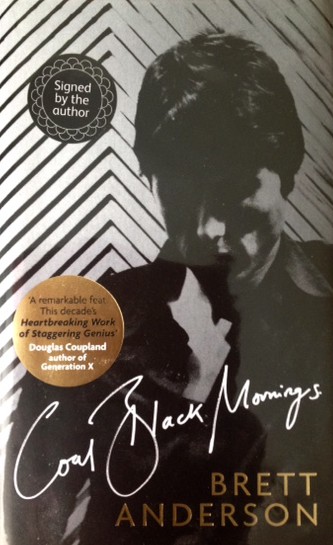Inspiring Older Readers
 posted on 26 Apr 2018
posted on 26 Apr 2018
Coal Black Mornings by Brett Anderson
Back when the 1980s turned into the 1990s I had become pretty detached from the pop and rock music scene – everyone had seemed to succumb to the ‘second summer of love’ and dance music was everywhere. I'm happy to admit that there’s never been a time when I was a dancer but doing it amid blinding arrays of strobing lights in rooms full of foam and bubbles and blissed out on Ecstasy was not only not my thing but it was also clearly something young people did – and I was no longer young. Temperamentally, I’d developed into a die-hard Indie music fan but in truth a steady diet of The Pixies, Throwing Muses, Smashing Pumpkins and Nirvana had become a touch….how should I say it…..dark?
1993 however turned out to be something of a turning point or renaissance mainly because of two singles that snuck up and gave me a whack around the head reminding me that pop and rock can be edgy, glamorous, flamboyant and full of possibilities. The records in question were Lipgloss by Pulp and Suede’s Animal Nitrate. As it turned out these weren’t going to be the best stuff either band would go on to do but they were good enough to wake me up and trigger another decade of buying records and heading off to live gigs. And for that, I will always love these two bands way more than they probably deserve.
When I read that Suede’s louche lead singer, Brett Anderson, had written a memoir – no, not ghosted, he’s actually written it – I couldn’t resist taking a look. I was even more intrigued when I discovered that what Anderson was writing was about his life in the years prior to the band signing up for their recording breakthrough and that he had no interest in a stereotypical ‘my life in the big time and on the road’ rock autobiography. So, I should warn you, don’t go to this book thinking that Suede’s substantial dirty laundry is going to get a public airing.
Let’s start with the obvious – Anderson isn’t a professional author and whilst his prose is more than serviceable, colourful even at times, it can be a bit self-conscious and clunky. Anderson is clearly a thoughtful man striving to be emotionally honest but he does remind us about that a little too often I think.
But actually that’s a bit of a niggley criticism because overall I found myself romping through the book a fair old rate and thoroughly enjoying it.
Anderson had quite a difficult working class upbringing and the early childhood years and his school days are sensitively done but present a portrait of family life that has plenty of precedents in memoirs of this kind. For me the book doesn’t really start to soar until the kernel of what would become Suede starts to coalesce and two big names enter Anderson’s life – Justine Frischmann and Bernard Butler.
From that point onwards the book becomes irresistible as he describes the way his relationship with Frischmann begins, becomes integral to his life and then dramatically falls apart just on the edge of the commercial breakthrough. The pain of that break-up is tangible and not motivated by him and I rather applaud the fact that Anderson resists naming Blur’s Damon Albarn as the person Frischmann strikes up a relationship with – despite that being public knowledge. For me that underscores the honesty of his intension to explore his own issues rather than indulge in celebrity tittle-tattle.
But I found his description of his relationship with Bernard Butler most intriguing of all and the fact that this close creative collaboration should also collapse acrimoniously later on throws up plenty of unanswered questions about Anderson’s role in both of his seminal relationships.
Given that I wasn’t looking for or expecting dazzling prose, only one aspect of the book slightly irritated me and that was Anderson’s constant urge towards self-deprecation. I know that this is almost certain a defence mechanism and I can fully sympathise with that but I do think his constant desire to tell us how rubbish he was rather gets in the way of really understanding his part in the creation of what would be a seminal band of the early 1990s.
However, if you even have a passing interest in Suede or the music of the early 1990s or maybe you’re just interested in how a rather ordinary working class boy reinvented himself to front a band that had the biggest selling debut album for over a decade, then you’ll find this an entertaining read.
Terry Potter
April 2018